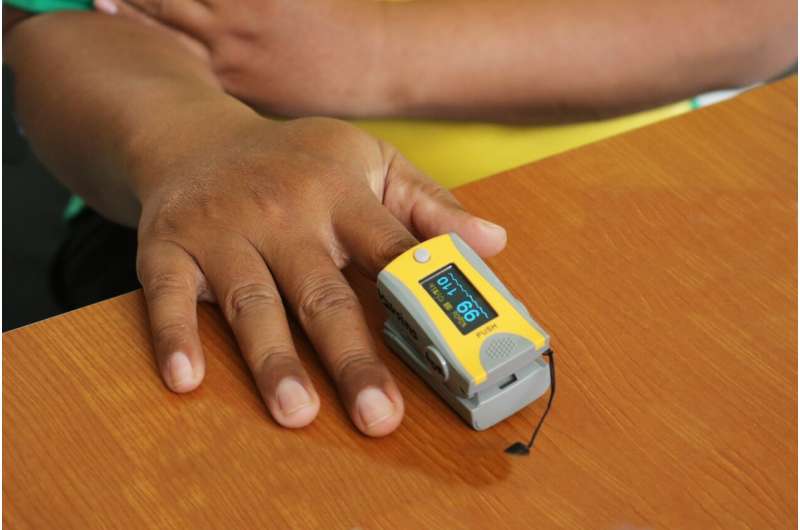Pulse oximeter readings for different ethnic groups unreliable in assessing severity of COVID-19 pneumonia

The severity of COVID-19 pneumonia can be difficult to assess in people from different ethnic groups, due to inaccurate readings from a device that measures the level of oxygen in the blood of patients.
The findings of the research, published in the European Respiratory Journal, show that pulse oximeters gave false readings of nearly 7 percent higher in a group of patients of Mixed ethnicity with COVID-19, compared to White patients at just over 3 percent. There were also falsely high readings in patients with both Black and Asian ethnicity, which could delay patients receiving the best and most timely treatment for the virus.
Pulse oximetry is a non-invasive test that measures the oxygen saturation level of the blood. It can rapidly detect even small changes in oxygen levels. These levels show how efficiently blood is carrying oxygen to the extremities furthest from the heart, including the arms and legs. Medical professionals routinely use them in primary care and critical care settings like emergency rooms or hospitals to monitor the clinical status of their patients.
The light wave transmission that this technology uses is modified by skin pigmentation and may vary by skin color. A recent study reported different outputs in patients with Black skin compared to patients with White skin, which has the potential to adversely affect patient care. This led to the Food and Drink Administration in the U.S. releasing an expression of concern about the accuracy of pulse oximeters in 2021, which led to the current study.
The study was delivered by a consortium of multidisciplinary teams from the University of Nottingham and Nottingham University Hospitals NHS Trust. They made use of the electronic datasets that are collected for clinical use in real time, but archived and available to answer important clinical questions and improve both patient care and patient safety in the future. The NUH COVID-19 Patient Safety Database is anonymised to allow lessons to be learned without compromising individual patient confidentiality. The team included clinicians, managers, statisticians, computer analysts, software coders and data warehouse archivists.
The team of experts from Nottingham used data from patients with COVID-19 infection to look at the difference in blood oxygen levels as measured by pulse oximetry and arterial blood gas tests, spilt into different ethnic groups over a wide range of oxygen saturations. Arterial blood gas tests measure the levels of oxygenin the blood from an artery, and represent the gold standard measurement for oxygen levels.
The team used electronic data for patients admitted to Nottingham University Hospitals NHS Trust between February 2020 and September 2021 with COVID-19 infection. Pulse oximetry measurements with a paired blood gas measurement within a half an hour window were compared.
Mean differences between pulse oximetry and blood gas oxygen saturations were recorded by ethnicity of White, Mixed, Asian, and Black patients, and were also split up by level of oxygen saturation as measured by arterial blood gases.
There were differences in oxygen saturations (amounts of oxygen in the blood), between the pulse oximetry arterial blood gas readings in all groups. The highest difference was in the Mixed ethnicity group which was nearly 7 percent higher in the oximetry reading, with the lowest in the White group at 3.2 percent higher than the true measurement from arterial blood gases. A reading of 5.4 percent higher using pulse oximetry was found in the Black group of participants and 5.1 percent higher in the Asian population.
The difference between the readings also increased in the clinically important range of 85 to 89 percent, when many clinical decisions are made. Mean values as measured by pulse oximeter were higher than reality in individuals with a recorded Black and Asian ethnicity, compared to those of a White ethnicity.
The findings of the research are important as high levels of skin pigmentation are associated with ethnic groups who have a poorer outcome from COVID-19 infection, and would require the most accurate oxygen measurements available in order to deliver the most appropriate and timely treatment.
Dr. Andrew Fogarty, from the School of Medicine at the University and the lead author of the study, said: "This data builds on what we know, which is that patients with darker skin have less accurate oxygen measurements using the pulse oximeters. Any error of measurement of oxygen levels will make assessing the severity of COVID-19 infection more difficult, and may delay delivery of timely medical care. We are now exploring the impact of this on clinical outcomes to see if it may have led to any issues in escalating treatment intensity for our patients."
More information: Pulse oximeters' measurements vary across ethnic groups: An observational study in patients with COVID-19 infection. European Respiratory Journal 2022; doi.org/10.1183/13993003.03246-2021





















